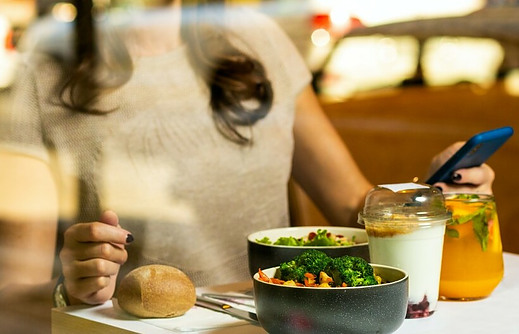
Mindful eating isn’t just another fad diet or a buzzword in wellness circles; it’s a transformative approach to how we interact with food. Rooted in the practice of mindfulness, which is all about living in the moment and being fully present in our activities, mindful eating encourages a kind of food-focused meditation.
Contrary to the autopilot mode we often find ourselves in while snacking in front of the TV or gobbling down lunch at our desks, mindful eating is about savouring each bite. It’s a departure from diets that focus solely on weight loss, macros, or calorie counting, and instead, emphasizes a holistic view of eating.
But why does any of this matter? Well, there’s ample evidence suggesting a myriad of benefits for your body and mind. For example, eating mindfully can lead to better digestion, as you’re more likely to chew your food thoroughly and eat at a slower pace. Psychologically, it can reduce stress and create a more gratifying relationship with your meals.
You might be wondering how this all fits into your daily life. After all, the practice of mindfulness extends far beyond your dinner plate. It’s a skill that, once honed, can enhance every part of your day. From the way you handle stress at work to how deeply you enjoy a simple walk in the park, mindfulness in all its forms is integral to a balanced life.
Let’s move forward and dive into the mechanics of mindfulness. I’m going to show you that, with some practice and patience, mindfulness can revolutionize not only the way you eat but also how you engage with the world around you.
The Mechanics of Mindfulness: Its Role in Daily Activities
Mindfulness might seem like a buzzword these days, but it’s a bona fide practice with deep roots and real benefits. At its core, mindfulness is about staying in the present moment, aware of where you are and what you’re doing, without becoming overly reactive or overwhelmed. It’s about noticing the details of your life that often go unnoticed because you’re too busy thinking about the past or planning for the future.
Incorporating mindfulness into your daily activities can significantly enhance your overall well-being. It’s not just an exercise you do; it’s a way of living. When you’re truly mindful, stress doesn’t hit you as hard. You’re able to enjoy the pleasure of simple activities, make better decisions, and improve your focus and concentration. Studies even suggest that regular mindfulness practice contributes to physical health by lowering blood pressure, improving sleep, and boosting the immune system.
You’re going to find out about practical ways to practice mindfulness that are simple, yet profound in their effects. Take walking, for instance. Instead of zoning out on your walk to work, try to notice your surroundings: the rhythm of your footsteps, the pattern of your breath, the sounds and smells around you. Even mundane chores like washing dishes can become moments of mindfulness if you focus on the sensation of warm water on your hands, the smell of the soap, and the sound of the dishes clinking gently in the sink.
As you become accustomed to noticing these small details in day-to-day life, switching to a mindful eating approach feels more natural. You’re already primed to pay attention to the sensory experience of eating—the texture, flavour, and aroma of your food. You can see how mindfulness is not just an isolated practice but a coherent part of a bigger picture, seamlessly flowing into the next aspect of your life, such as the way you eat.

Integrating Mindful Eating Into Your Daily Routine
I’m going to take you through some straightforward steps to start including mindful eating in your everyday life. You’ll see, it’s not about overhauling your entire diet overnight.
You’ve got to start by slowing down. That means actually sitting down for meals and focusing on the flavours, textures, and sensations of the food you’re eating. Ever really savoured the crunch of a fresh apple? That’s what you’re aiming for.
Let’s talk about hunger cues. Sometimes we eat just because the clock says it’s time. Try this: before you automatically plate up for lunch, pause. Check in with yourself. Are you hungry, or are you just eating out of habit?
It’s about honoring your hunger and respecting when you’re full. It can be a game-changer to push the plate away when you’re satisfied, not stuffed. And let me tell you, it feels great not to waddle away from the dinner table.
Choose something that resonates with you, like creating a pleasant dining atmosphere. It can help you focus on your meal and enjoy the process. So, light a candle, play some soft music, or set the table with care — whatever makes the setting special for you.
Remember, eating should not be a race. If you’re wolfing down your food, how can you enjoy it? Take time to chew. Put your fork down between bites. Breathe. This not only aids digestion but also lets you catch those signals that you’re full, preventing overeating.
Now let’s be real; life is chaotic, and not every meal can be a Zen experience. And that’s okay. If you have to grab a quick bite now and then, don’t fret. Just bring a bit more awareness to your next meal. You can always adjust your approach down the road.

Why Mindful Eating Matters: A Look at Long-Term Impacts
Let’s get down to the nitty-gritty of why adopting a mindful eating practice can play such a crucial part in your life over time. You’re going to find out about mindful eating’s far-reaching effects, extending well beyond those initial feelings of contentment post-meal. It roots deeply within your overall health by fostering a relationship with food that’s based on respect and awareness rather than just taste and convenience.
One of the most impactful benefits is the transformation that occurs in the way you approach food. No longer a mere response to cravings, eating becomes an intentional act. There’s a lot of opportunity in this shift to influence your nutritional choices positively. By paying attention to what and how you eat, you can align your diet more closely with your body’s actual needs.
…>> Click here to get a free mindfulness course<<…..
In my opinion, the real magic happens when this practice spills over into other areas of your life. Mindful eating can lead to weight management without the stress of dieting, as it encourages natural portion control and reduces binge eating tendencies. It can even play a role in managing health conditions like diabetes by promoting better blood sugar control.
If you want to see sustained improvements in your well-being, remember that this isn’t a quick fix—it’s a lifelong journey. Just don’t focus too much on perfection; it’s all about progress. Choose something that resonates with you, and allow yourself the flexibility to grow and adapt with your mindful eating practices.

In summary, embracing mindful eating is like giving a gift to yourself every day. It’s an investment in your long-term health, creating a joyful and intuitive eating experience. My hope is that, armed with the knowledge from this article, you’re inspired to take that first step towards a more mindful approach to eating and experience the profound effects it can have on your life.
Thank you for your time and please feel free to share your experiences with me in the comment section below.
Cheers.



Hi, I still remember learning that your are what you eat literally. As in your physical tissues are made from the foods you eat literally. So I realized that I was drinking and eating junk and how much that must be affecting everything about my life and health. Got to avoid those preservatives. Eat fruits and veggies and I am a big meat eater. Have a good one.
Hi there and thank you for sharing!
This approach encouraged me to eat slowly, without distraction, and to listen to my physical hunger cues which is top.
Your post is a valuable resource for anyone looking to improve their relationship with food and cultivate healthier eating habits.
I’m looking forward to exploring more of your content!
Best regards,
Idem